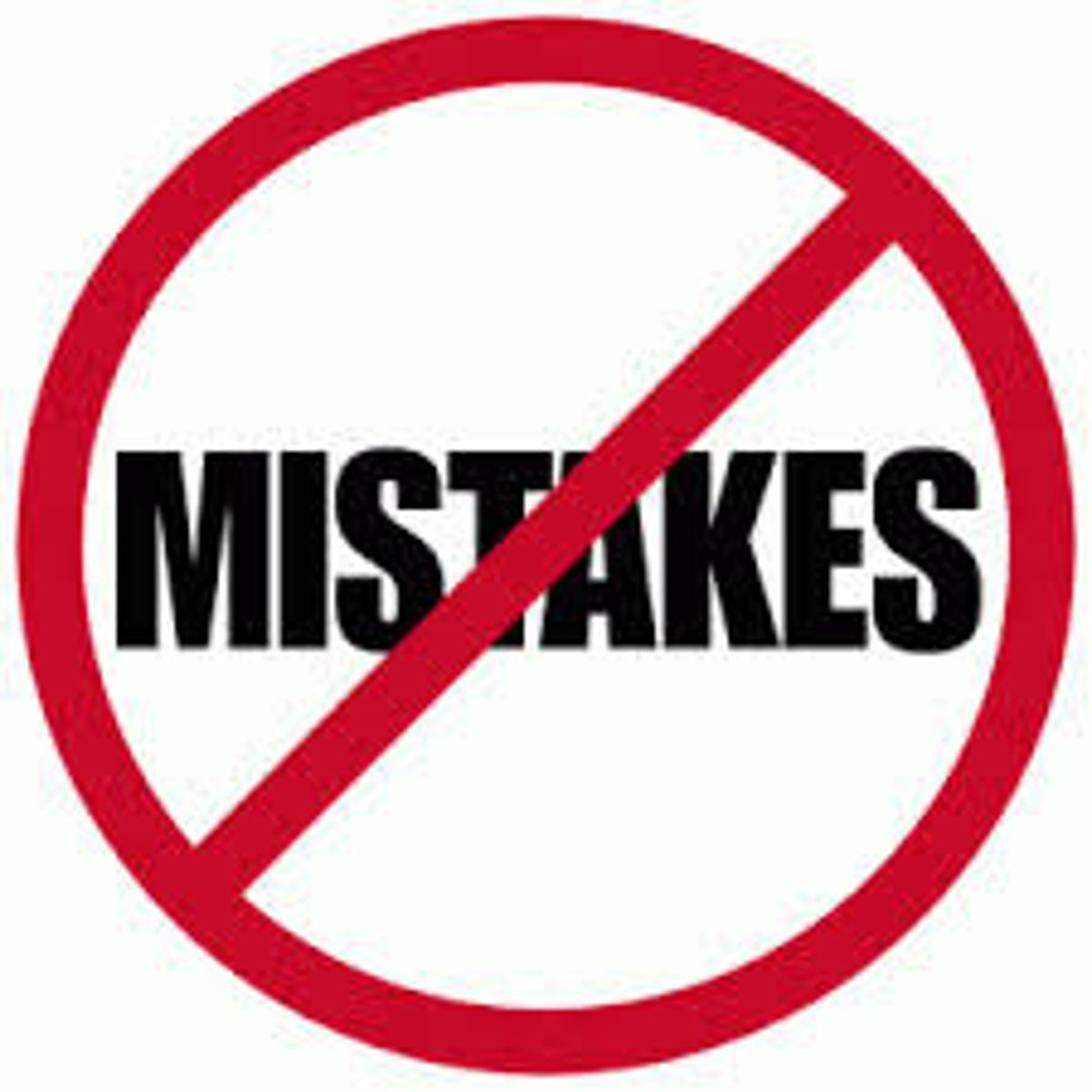This thing
1/82
There's no tags or description
Looks like no tags are added yet.
Name | Mastery | Learn | Test | Matching | Spaced | Call with Kai |
|---|
No analytics yet
Send a link to your students to track their progress
83 Terms
Liturgy
A common prayer ceremony.
Apostolic Succession
The unbroken lineage of Popes and Bishops from the time of Jesus to the modern day.
Christian
The general term that applies to anyone who believes Jesus is the Christ (i.e., the Messiah, the chosen one, the savior).
Catholic
Refers to those Christians who belong to the Church Jesus established by professing the same faith as the Apostles (the Apostles' Creed) and following their successors (the Pope and Bishops). It also means "universal."
Orthodox
A term referring to the Greek Orthodox Church that split from the Roman Catholic Church in 1054 A.D.
Great Schism
The separation of the western Roman Catholic Church and the eastern Greek Orthodox Church as a result of the term "Filioque" in Nicene Creed. It occurred in 1054 A.D.
Protestant Reformation
A religious movement of the 16th century with the goal of reforming the Catholic Church. It had two key figures: Martin Luther and King Henry VIII. Luther was frustrated with the state of the Church and nailed his 95 Theses to a church's door. He broke off and founded the Protestant religion of Lutheranism. King Henry VIII established the Church of England (Anglicanism) after the Pope said he couldn't keep divorcing and killing his wives.
"Protestant" refers to Christians who protest against the Catholic Church, do not share the same beliefs, and do not follow the Pope or Bishops.
One
The fullness of Truth is contained in the Catholic Church, in whom the Body of Church is united to each other and to Jesus Christ.
Holy
The Holy Spirit leads and guides the Church. The Church's sacramental life also helps us to grow in holiness.
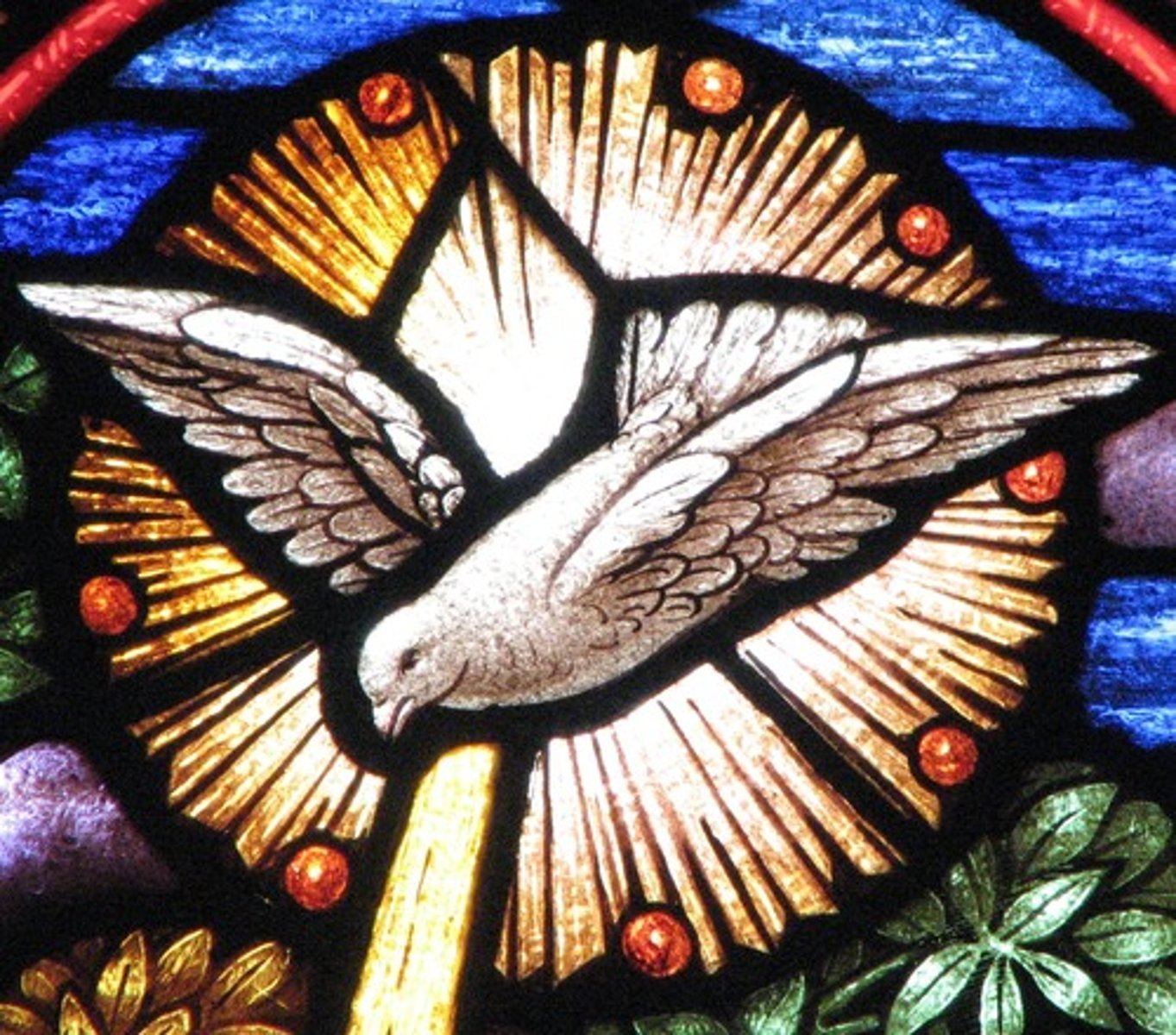
Catholic (Mark of the Church)
All people are called by God to be one in His church. The faith is for everyone. Catholic means "universal" → God's one Church spread throughout the world.
Apostolic
The Church is built upon St. Peter (the first Pope), the Apostles (the first bishops), and their successors.
Fast
A period of not eating. We fast during Ash Wednesday (the start of Lent) and Good Friday (the day Jesus died). A fast consists of one meal and two small snacks that together do not comprise a whole meal.
Abstain
The avoidance of certain foods. During Fridays in Lent, we must not consume meat. Catholics may choose same other penance on other Fridays throughout the year.
Chapel
A sacred place where liturgies take place but without a permanent Sunday Mass community.
Church
A sacred place for liturgies with a permanent Sunday Mass community.
Cathedral
A church containing the "cathedra" or "chair" from which a bishop governs his diocese.
Basilica
A large, beautiful church (sometimes but not always cathedrals) that the Pope has recognized and designated for special liturgical purposes.
Cathedra
The chair of the bishop located in a cathedral from which he governs his diocese.
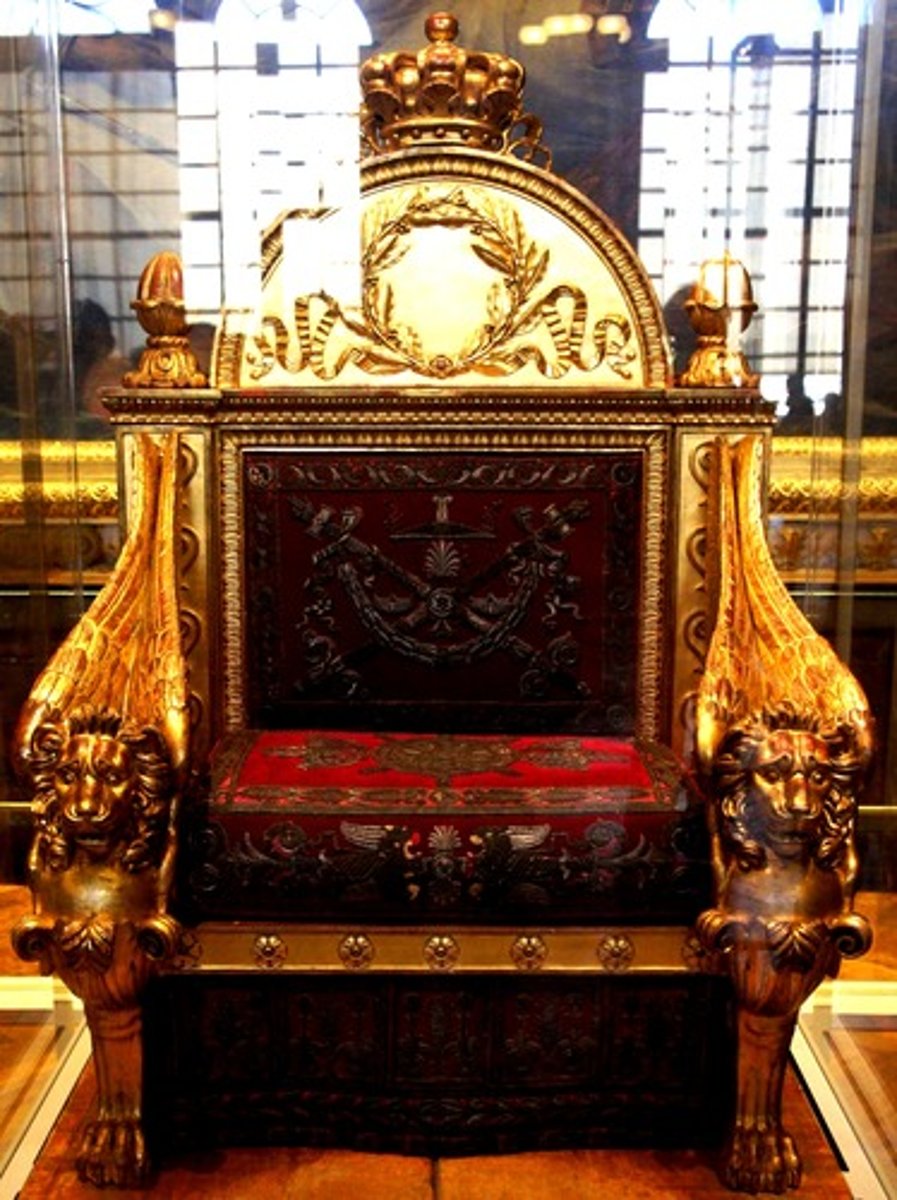
Pope
Successor of St. Peter; Bishop of Rome; Supreme Pontiff of the Catholic Church. The Pope exercises a primacy of authority as Vicar of Christ and shepherd of the whole Church. He receives the divine assistance promised by Christ to the Church.
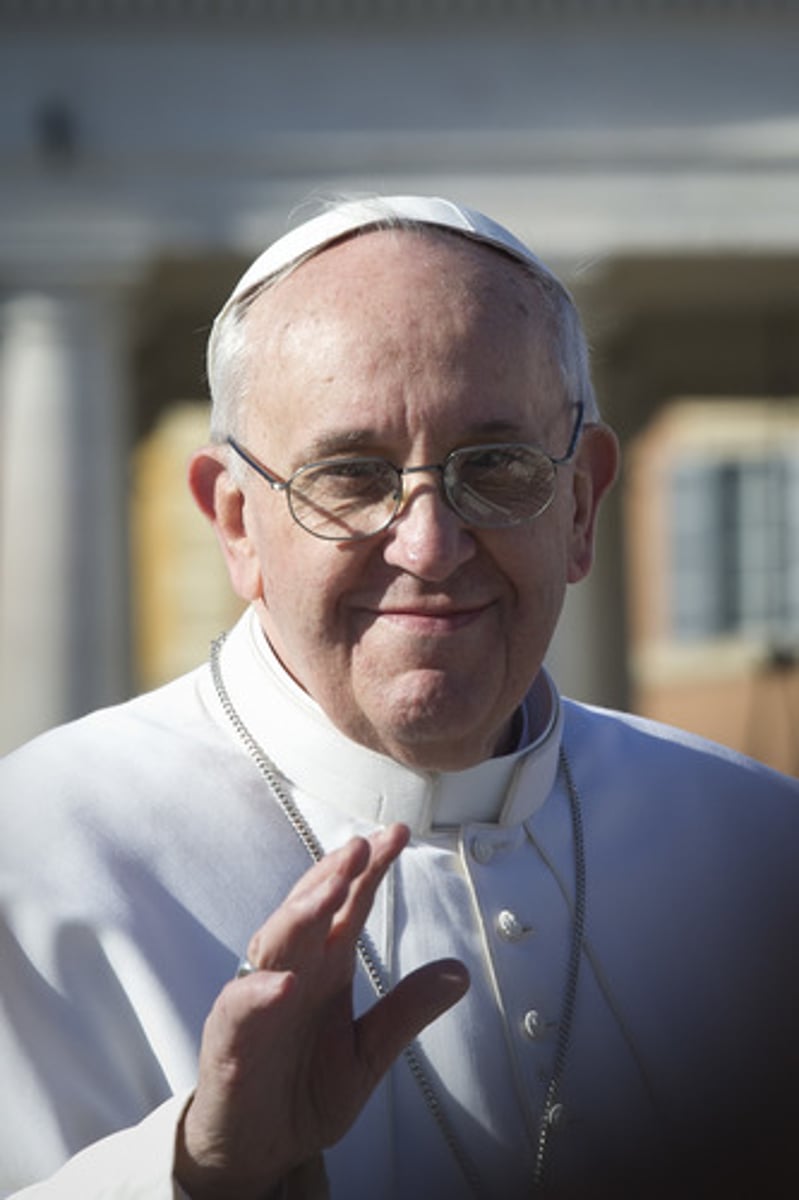
Cardinal
A member of a special college that elects the Pope (the college of cardinals). This person assists the Pope in administering the Church. They are lower than the Pope.
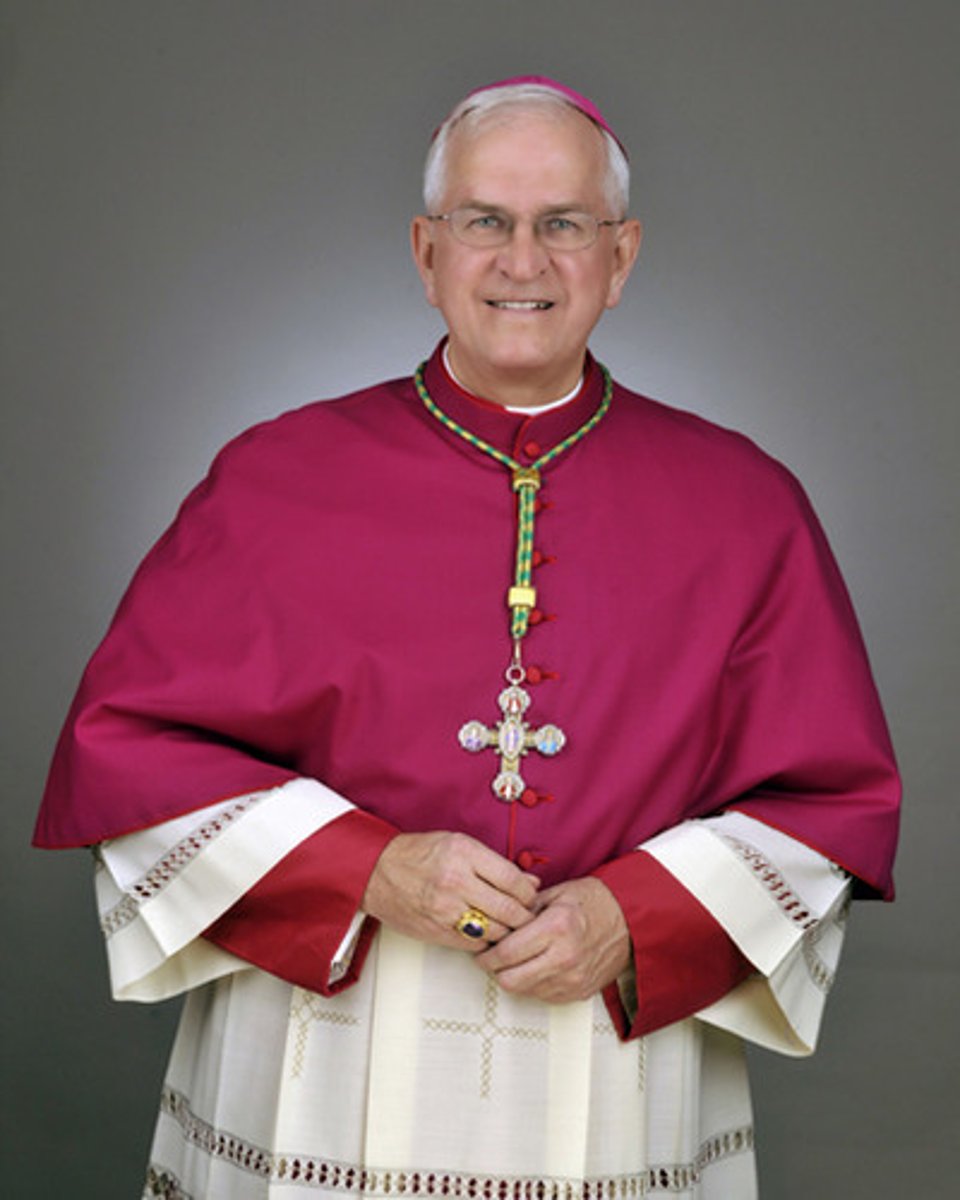
Bishop
From the Greek for "overseer." By divine institution, he succeeds the Apostles through the Holy Spirit, who is given to him. He is constituted a pastor in the Church, the teacher of doctrine, the priest of sacred worship, and the minister of governance. They are lower than the cardinals.
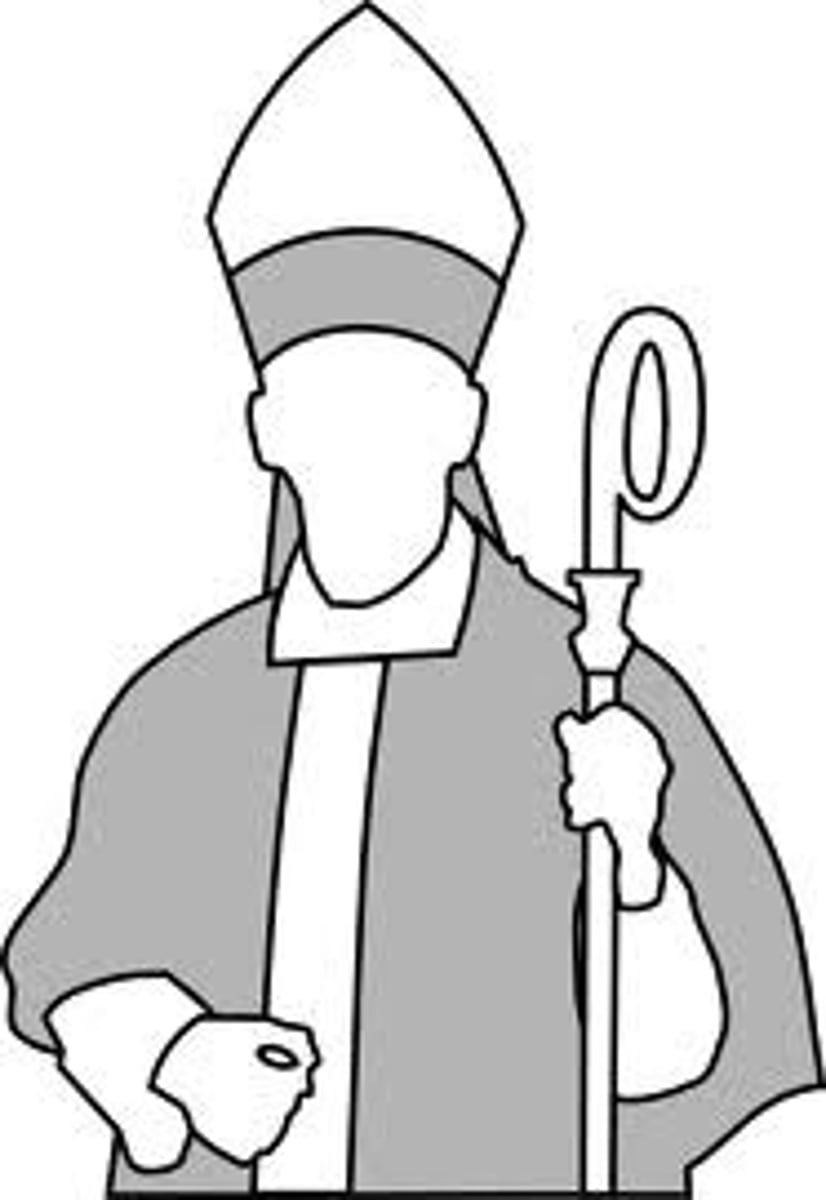
Diocese
A portion of the People of God that is entrusted to a bishop to be nurtured by him, with the cooperation of his priests, in such a way that, remaining close to its pastor and gathered by him through the Gospel and the Eucharist in the Holy Spirit, it constitutes a particular Church. In this Church, the one, holy, catholic, and apostolic Church of Christ truly exists and functions.
Priest
A term derived from the Greek word presbyteros. In the Church, a priest is a baptized and confirmed male who ordained to be a co-worker with his bishop, to preside at public liturgies, to celebrate the Sacraments and assist his bishop in priestly service to the People of God.
Deacon
From the Greek word for "servant"; one who has been ordained to the third degree of Holy Orders, ordained not to priesthood but for ministry and service.
Laity
All the faithful, except those in Holy Orders and those in the state of religious life specially approved by the Church. They carry out, for their own part, the mission of the whole Christian people in the Church and in the world.
Pontiff
Means "bridge builder." This title for the Pope states that he is responsible for maintaining the bridge between Jesus and His Church.
Vicar of Christ
Papal title first used by Pope Innocent III in place of "Vicar of St. Peter." "Vicar of Christ" emphasized his understanding of the Pope as the representative of Christ himself.
Conclave
From the Greek for "with key"; the gathering of the world's cardinals for the election of a new Pope, which takes place in the Sistine Chapel in the Vatican behind closed doors.
Papal Infallibility
The guarantee that the Pope and the Magisterium would be infallible, or "free from error," in their public teachings on matters of faith and morals. It is made possible by the work of the Holy Spirit in the Church. Hence, the papacy preserves the truth of God that liberates Church members from error.
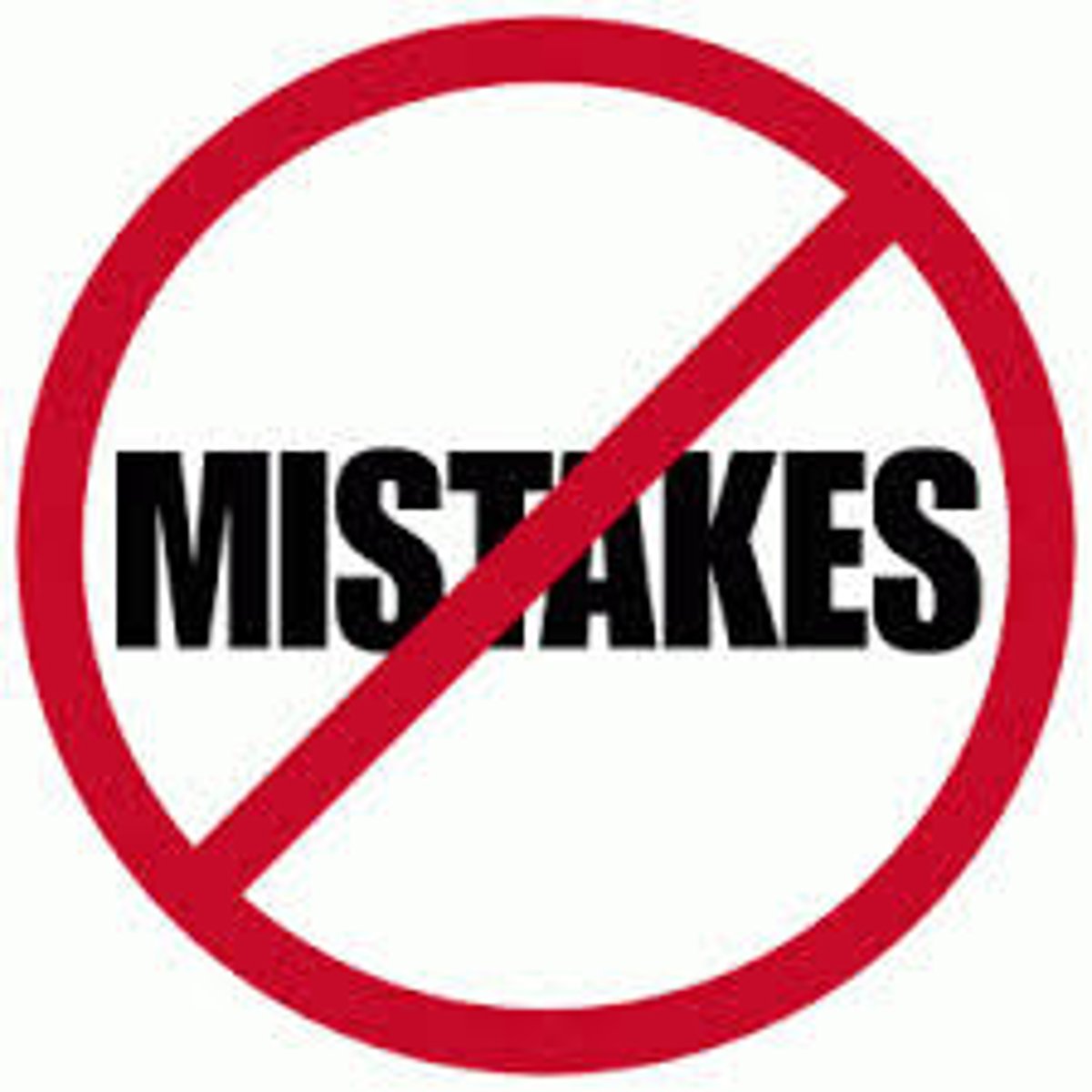
Church Suffering (Penitent)
The souls in purgatory.
Church Militant
The souls fighting the good fight on earth.
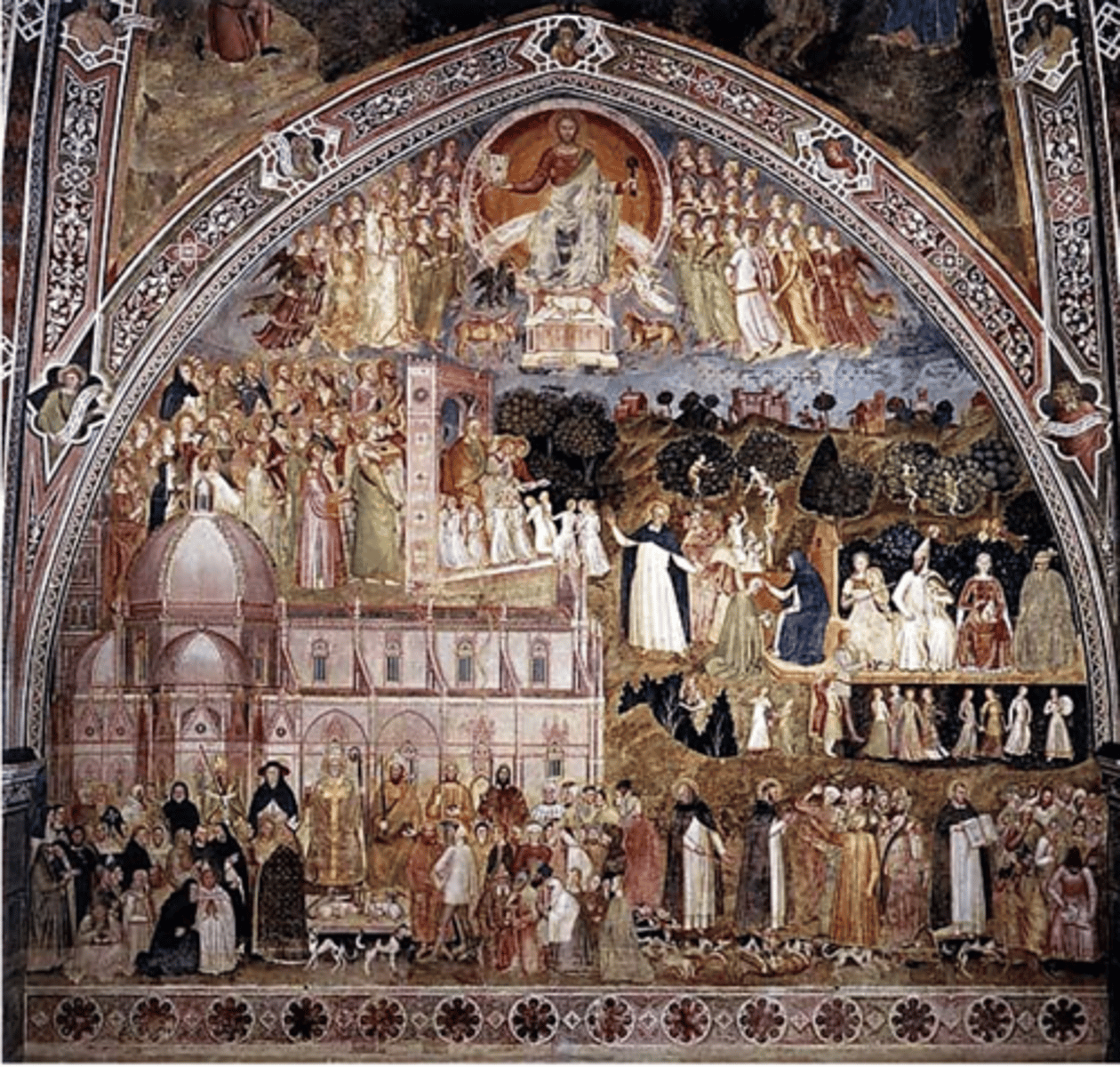
Church Triumphant
The souls in Heaven rejoicing, waiting for us to join them.
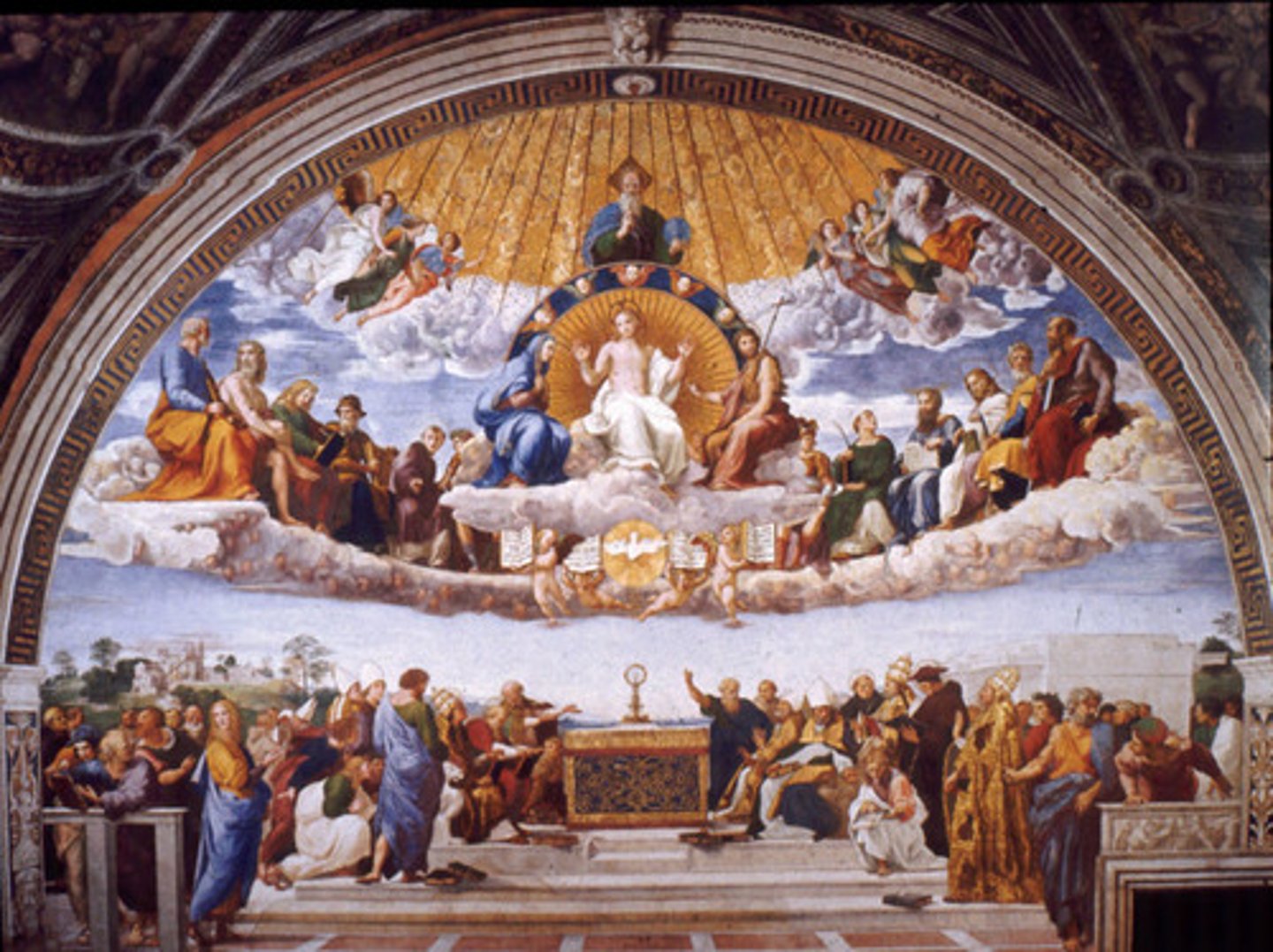
One
The fullness of Truth is contained in the Catholic Church, in whom the Body of Christ is united to each other and to Jesus Christ.
Holy
The Holy Spirit leads and guides the Church. The Church's sacramental life also helps us to grow in holiness.
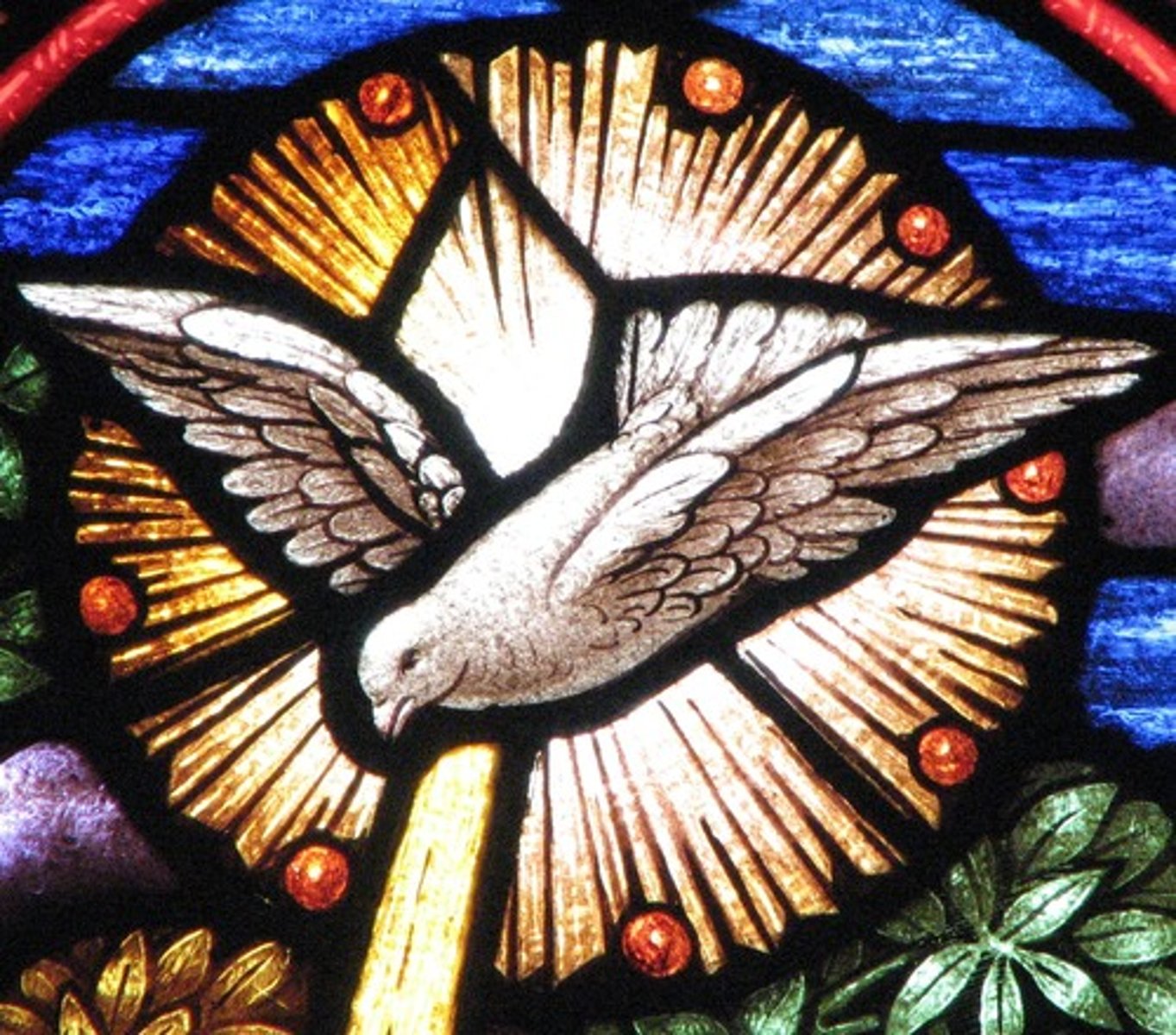
Catholic
All people are called by God to be one in His church. The faith is for everyone. Catholic means "universal" → God's one Church spread throughout the world.
Apostolic
The Church is built upon St. Peter (the first Pope), the Apostles (the first bishops), and their successors.
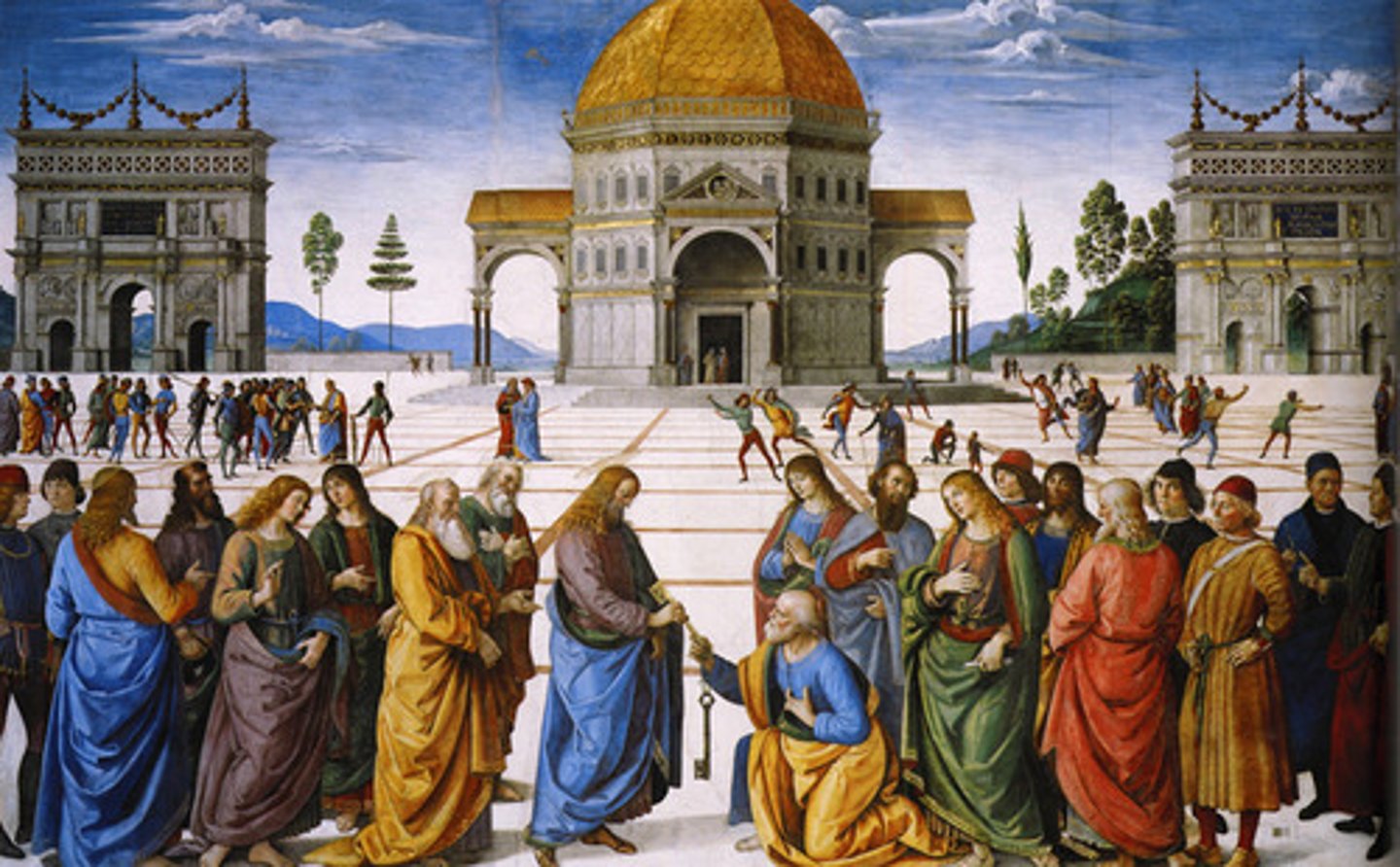
Who is the Holy Spirit?
Third Person of the Trinity; he is co-equal and co-eternal with the Father and the Son (Filioque). The Holy Spirit is the Lord, the giver of life, who proceeds from the Father and the Son, who with the Father and the Son is adored and glorified, who has spoken through the prophets (clarified by the Nicene Creed in 382 A.D.).
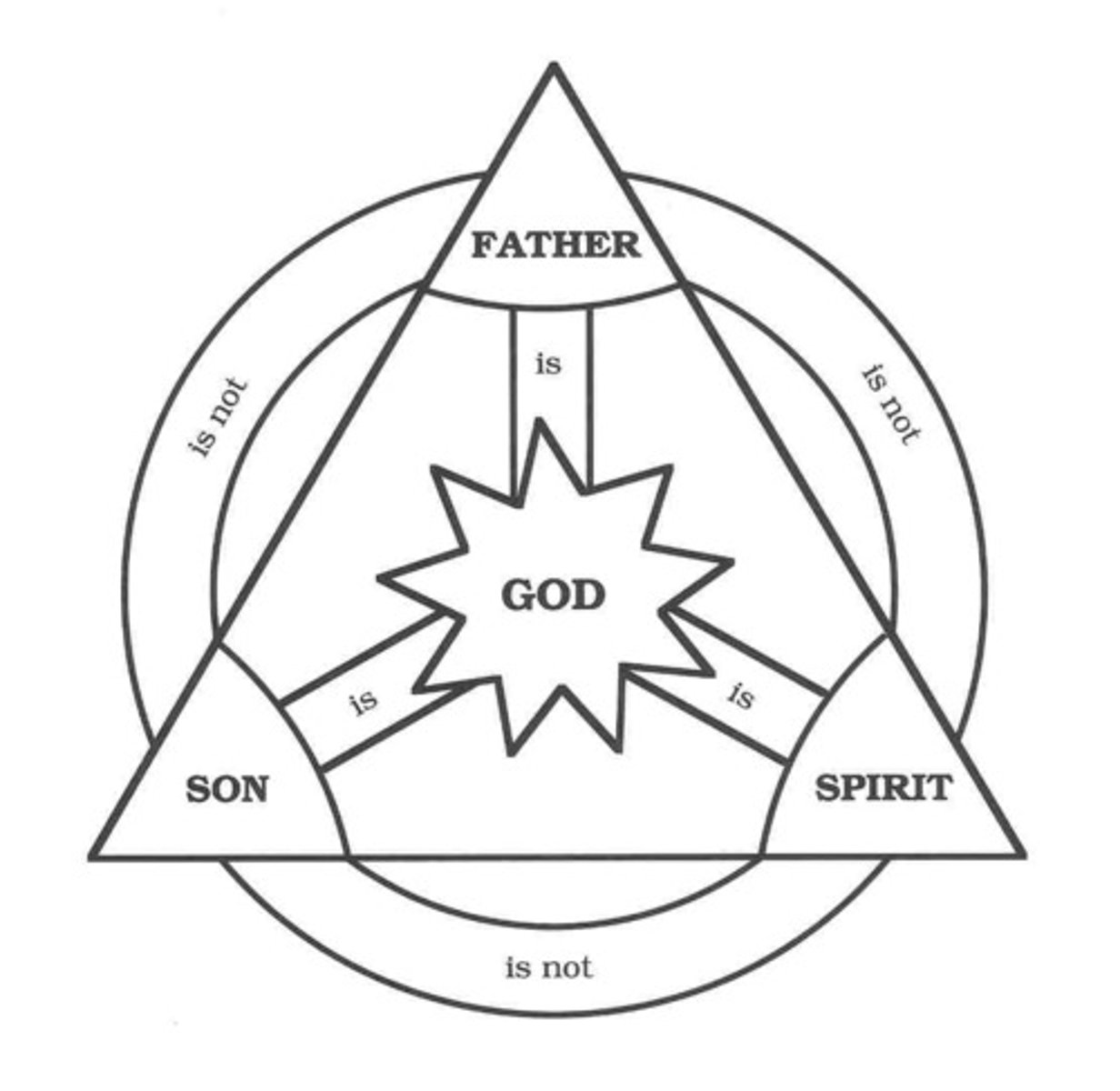
Filioque
A Latin word meaning "and the son." To further clarify the Catholic beliefs present in the Apostles' Creed, the Council of Nicaea was formed. The Nicene Creed states that "the Holy Spirit is the Lord, the giver of life, who proceeds from the Father and the son, who with the Father and the son is adored and glorified, who has spoken through the prophets. " The term Filioque led to the Great Schism of 1054; Romans Catholics believe that the Holy Spirit proceeds from both the Father and the Son, whereas Orthodox Christians believe that the Holy Spirit just proceeds from the Father.
What does the Holy Spirit do?
He has spoken through the prophets, inspired the Scriptures, and guarantees the truth of the Church's teachings. He is our advocate (speaks on our behalf and helps us) and guide.
He is also the:
- Love between the Father and the Son that overflows into a creative love of the world.
- Creator of life and the universe (the breath of God). "Breath" — spirit/soul (the animating principle of something).
- Presence of God in his Church today since the physical body of Jesus is no longer with us (he ascended into heaven).
Paraclete
A Greek word referring to the Holy Spirit. This is what Jesus called him when he promised to send the Holy Spirit. While there is no direct translation, it means "called to one's aid" in English. Christ stated that the 3rd person of the Trinity, the Paraclete, is our advocate, guide, teacher, counselor, intercessor, helper, and comforter.
* Intercessor - a person who intervenes on behalf of another, especially by prayer.
Symbols of the Holy Spirit
Water, Anointing, Fire, Cloud and Light, Hand, Dove
When was the Holy Spirit fully revealed?
The Holy Spirit is Lord, and since Lord means God, he is co-eternal with the Father and Son and has been active in Salvation History (the story of God saving humanity from sin and death). The Holy Spirit is fully revealed and given to the Church at Pentecost.
Pentecost
A Jewish feast commemorating the day God gave Moses the 10 Commandments 50 days after he led the Israelites out of slavery
in Egypt. It also celebrates the establishment of God's chosen people: the Israelites. Before Jesus ascended into heaven, he promised to send the Holy Spirit to the Apostles. This Jewish feast became a Christian feast day, as it marks the beginning of the Church's public ministry in the world. 50 days after Jesus' resurrection, which fell on the day of Pentecost, the Holy Spirit visited the Apostles and filled them with strength, courage, and the knowledge necessary for them to execute their new mission: to tell the world of the Gospel (aka Jesus Christ the one who saved humanity from sin and death). The Apostles left the upper room and began to preach the Gospel in multiple languages (that they never knew previously), and each person in Jerusalem understood them in his own native tongue. That day, 3000 people were baptized.
What are the Gifts and Fruits of the Holy Spirit?
The Holy Spirit is God's presence in His Church. The gifts of the Holy Spirit are supernatural habits that are infused into the soul. The effects of the gifts of the Holy Spirit are called the fruits. These are supernatural acts or works that flow joyfully from the Christian life. By the fruits, the soul begins to experience the peace and freedom God had won for us.
7 Gifts of the Holy Spirit
1. Wisdom - the ability to judge correctly our experiences and those events occurring around us. The standards a Christian uses to judge between right and wrong must be based on the objective truth given to us by Jesus Christ and taught by his Church. Although wisdom begins in the intellect, it can only grow and bear fruit when the will is conformed to the love of God. Therefore, wisdom is directly related to our love for God and increases through the grace we receive in the Sacraments and prayer.
2. Understanding - perfects our perception of the mysteries of the Faith, enabling us to penetrate more deeply into the divine truths revealed by God.
3. Counsel - helps us make wise decisions, choosing promptly, correctly, and according to the will of God. It enables us to choose those actions that will be for the glory of God and for our own salvation. This gift flows from the gifts of wisdom and understanding, and perfects the virtue of prudence.
4. Fortitude - is strength of character. It makes us steadfast in the Faith, constant in struggle, and faithful in perseverance. This gift of the Holy Spirit gives us the strength and courage to endure long and trying difficulties and to complete the tasks we have undertaken in the service of God.
5. Knowledge - enables us to use created things wisely. This gift of the Holy Spirit permits us to live a life of detachment from possessions, using created things as God intended.
6. Piety - teaches us the meaning of divine filiation, the joyful supernatural awareness of being children of God and brothers and sisters of all mankind. It leads us to a true love of God as our merciful Father and love of all human beings as his children. This reality should radically change the way we treat our neighbor.
7. Fear of the Lord - is fear in the sense of awe or reverence rather than terror. It refers to our sense of sovereign respect in the presence of an all-powerful and loving God. This gift leads us to know the evil of sin and, therefore, to detest it, and it impresses upon our hearts a spirit of adoration and a profound and sincere humility.
12 Fruits of the Holy Spirit
1. Love - helps us to love God and our neighbor as we ought, in keeping with the Great commandment of Christ.
2. Joy - an inner spirit of happiness that remains in spite of troubles and tragedy. It is the result of keeping our thoughts on Heaven and on the knowledge that virtue and life, not sin and death, will triumph in the end.
3. Peace - comes from the awareness of God's presence among and within us. When we foster this presence through prayer and contemplation, this virtue of peace will grow stronger in our lives.
4. Patience - a virtue terribly lacking in modern society in which instant gratification seems to be the goal of so many people. If we love and trust God and know the peace that only he can give us, we will find ourselves becoming more patient with both ourselves and others.
5. Kindness - comes from recognizing Christ in every person and treating him or her accordingly. Slandering others, making cruel or sarcastic remarks at their expense, or treating them discourteously or with insensitivity is inconsistent with the life of a true follower of Christ. The HS can help us cultivate this virtue, even when lazy habits or a caustic (incisively sarcastic) nature are deeply ingrained within us.
6. Generosity - a measure of our response to all that God has given us. Whatever good we have is meant to be shared—whether it is our faith, our time, or our wealth. The generous person will recognized that carrying out the mission of Christ in this world means having a very generous spirit toward those who are in need.
7. - Faithfulness - the fruit that insidious influences can whittle away in our relationships with Christ. Laziness, lukewarmness (a certain apathy in our spiritual practice, and peer pressure can weaken the practice of our faith in small ways that can rapidly become large ways. When we begin to rationalize not making time to pray or when we fail to stand up for the truths of the Faith, we have begun to waver in our fidelity. The HS can help us maintain the faithfulness demanded of us by Christ.
8. Gentleness - related to the fruits of kindness, patience, and love. A gentle disposition is necessary if we are to treat others charitably and with respect for their feelings.
9. Self-control - having command over our passions. This virtue involves avoiding unjust or disproportionate anger, gluttony, drunkenness, or sins against purity. Our thoughts and actions with regard to the body should reflect the divine presence within us.
10. Modesty - allows us to avoid the sin of pride, vanity, boasting, or seeking praise from others. It also means care and decorum in how we dress, act, and treat others.
11. Chastity - practicing purity within one's state of life. For priests and religious who have taken vows, as well as for unmarried persons, chastity means avoiding all sexual activity and lustful attractions. For a married couple, it means ensuring that every sexual expression is open to new life and a true act of self-giving love shared with each other exclusively and with proper respect for the Church's teachings on sexuality and contraception.
12. Goodness - having an essentially good nature. This helps us consider the well-being of each person, the common good of the community, and our own pursuit of virtue in every action or decision we make. A person who lives a profound love for God will manifest goodness in all of his or her thoughts, words, and actions.
Liturgy
A common prayer ceremony.
Why is Christianity divided?
The Church was established by Jesus (God) on St. Peter and the Apostles (humans). What makes the Church Holy is the Holy Spirit, who never ceases to work in and through its imperfect leaders.
Christian
The general term that applies to anyone who believes Jesus is the Christ (i.e., the Messiah, the chosen one, the savior).
Catholic
Refers to those Christians who belong to the Church Jesus established by professing the same faith as the Apostles (the Apostles' Creed) and following their successors (the Pope and Bishops). It also means "universal."
Church Timeline
0 A.D. - the Incarnation: Jesus becomes man.
~33 A.D. - Jesus dies. Between 30 and 33 A.D., Jesus gave Peter the keys to the kingdom. From here to 1054 A.D., Christians, Catholics, and the Church all referred to one thing.
150 A.D. - The term "Christian" is first used. Before around 150 A.D., "Christians" called themselves "Followers of the Way."
1054 A.D. - The Great Schism occurs as a result of "Filioque" in the Nicene Creed. It caused Christianity to break off into the Greek Orthodox and Roman Catholic faith.
16th century, 1500s - Christianity divides further—into Lutheranism and Anglicanism/Episcopalianism—due to Protestant Reformation.
No change for about 2023 years.
Great Schism
The separation of the western Roman Catholic Church and the eastern Greek Orthodox Church as a result of the term "Filioque" in Nicene Creed. It occurred in 1054 A.D.
Orthodox
A term referring to the Greek Orthodox Church that split from the Roman Catholic Church in 1054 A.D.
Protestant Reformation
A religious movement of the 16th century with the goal of reforming the Catholic Church. It had two key figures: Martin Luther and King Henry VIII. Luther was frustrated with the state of the Church and nailed his 95 Theses to a church's door. He broke off and founded the Protestant religion of Lutheranism. King Henry VIII established the Church of England (Anglicanism) after the Pope said he couldn't keep divorcing and killing his wives.
"Protestant" refers to Christians who protest against the Catholic Church, do not share the same beliefs, and do not follow the Pope or Bishops.
What is the Church?
In Christian usage, the word "church" designates the liturgical assembly, but also the local community or the whole universal community of believers. These three meanings are inseparable. "The Church" is the People that God gathers in the whole world. She exists in local communities and is made real as a liturgical, above all a Eucharistic, assembly. She draws her life from the word and the Body of Christ and so herself becomes Christ's Body (CCC 752)
Who is the Church?
1. The Body of Christ
"You are the body of Christ and individually members of it. And God appointed in the Church first Apostles."
2. Bride of Christ
"Husbands, love your wives, as Christ loved the Church and gave himself up for her, that he may sanctify her."
3. Our Mother and Teacher
The Church gives birth to new sons & daughters of God. "No one can have God as Father who does not have the Church as Mother."
What is the Catholic Church?
1. A divine institution, established by
Jesus Christ and built upon the leadership of St. Peter (the first Pope), the Apostles (the first Bishops), and their successors.
- We call this Apostolic Succession.
2. God's family: the community of believers who continue Jesus Christ's mission of salvation after his ascension into Heaven (The Body of Christ)
3. Jesus Christ's Church on earth, in the hands of imperfect humans, and yet led by the Holy Spirit.
Apostolic Succession
The unbroken lineage of Popes and Bishops from the time of Jesus to the modern day.
When did the Church begin?
When Peter declares that Jesus is the Christ, Jesus responds, "You are Peter and upon this rock I will build my Church and the gates of Hell shall not prevail against it. • St. Peter, the first Pope, is usually depicted holding the keys to the Kingdom of Heaven.
Marks of the Church
1. One - The fullness of Truth is contained in the Catholic Church, in whom the Body of Church is united to each other and to Jesus Christ.
2. Holy - The Holy Spirit leads and guides the Church. The Church's sacramental life also helps us to grow in holiness.
3. Catholic - All people are called by God to be one in His church. The faith is for everyone. Catholic means "universal" → God's one Church spread throughout the world.
4. Apostolic - The Church is built upon St. Peter (the first Pope), the Apostles (the first bishops), and their successors.
5 Precepts of the Church
All families are bound together by common traditions and rules. God's family is no different. The precepts of the Church bind us to Christ and to each other.
1. Attend Mass on Sundays and Holy Days of Obligation.
2. Confess grave sins at least once per year.
3. Receive communion during Easter time.
4. Fast and abstain on days appointed.
5. Contribute to the support of the Church.
Why?
1. The worship of God the Creator should be the central focus of Christian life, and attending Mass sanctifies the rest of life.
2. Sins draw us away from God, and confession draws us back.
3. Without the Eucharist, we cannot have life.
4. Just as Christ bore the Cross before his Resurrection, so too do we need to discipline ourselves to follow Christ.
5. The Church is doing the work of God on earth, and everyone needs to participate in it.
Fast
A period of not eating. We fast during Ash Wednesday (the start of Lent) and Good Friday (the day Jesus died). A fast consists of one meal and two small snacks that together do not comprise a whole meal.
Abstain
The avoidance of certain foods. During Fridays in Lent, we must not consume meat. Catholics may choose some other penance on other Fridays throughout the year.
Holy Days of Obligation
January 1st: Mary, Mother of God.
Thursday of the 6th Week of Easter: Ascension.
August 15th: Assumption of Mary.
November 1st: All Saints Day.
December 8th: Immaculate Conception.
December 25th: Birth of Christ
What are ways of contributing to the Church?
- Tithe (giving money to support the Church and the poor). Traditionally, at least 10% of money is given.
- Be involved in the community.
- Volunteer (altar serve, usher, clean, welcome new parishioners, etc.)
The Church Today
The members of the Church are spread out across time and space. These are the 3 "states" of the Church:
1. Church Suffering (Penitent): souls in purgatory.
2. Church Militant: souls fighting the good fight on earth.
3. Church Triumphant: souls in heaven rejoicing, waiting for us to join them.
Chapel
A sacred place where liturgies take place but without a permanent Sunday Mass community.
Church
A sacred place for liturgies with a permanent Sunday Mass community.
Cathedral
A church containing the "cathedra" or "chair" from which a bishop governs his diocese.
Basilica
A large, beautiful church (sometimes but not always cathedrals) that the Pope has recognized and designated for special liturgical purposes.
Church Hierarchy
Pope, Cardinals, Bishops, Priests, Deacons, and Laity
Pope
Successor of St. Peter; Bishop of Rome; Supreme Pontiff of the Catholic Church. The Pope exercises a primacy of authority as Vicar of Christ, shepherd of the whole Church, and Holy Father. He is responsible for our spiritual well-being and should care for us like a father. He receives the divine assistance promised by Christ to the Church. The Pope is elected at a conclave and is infallible on dogmatic matters of faith and morals.
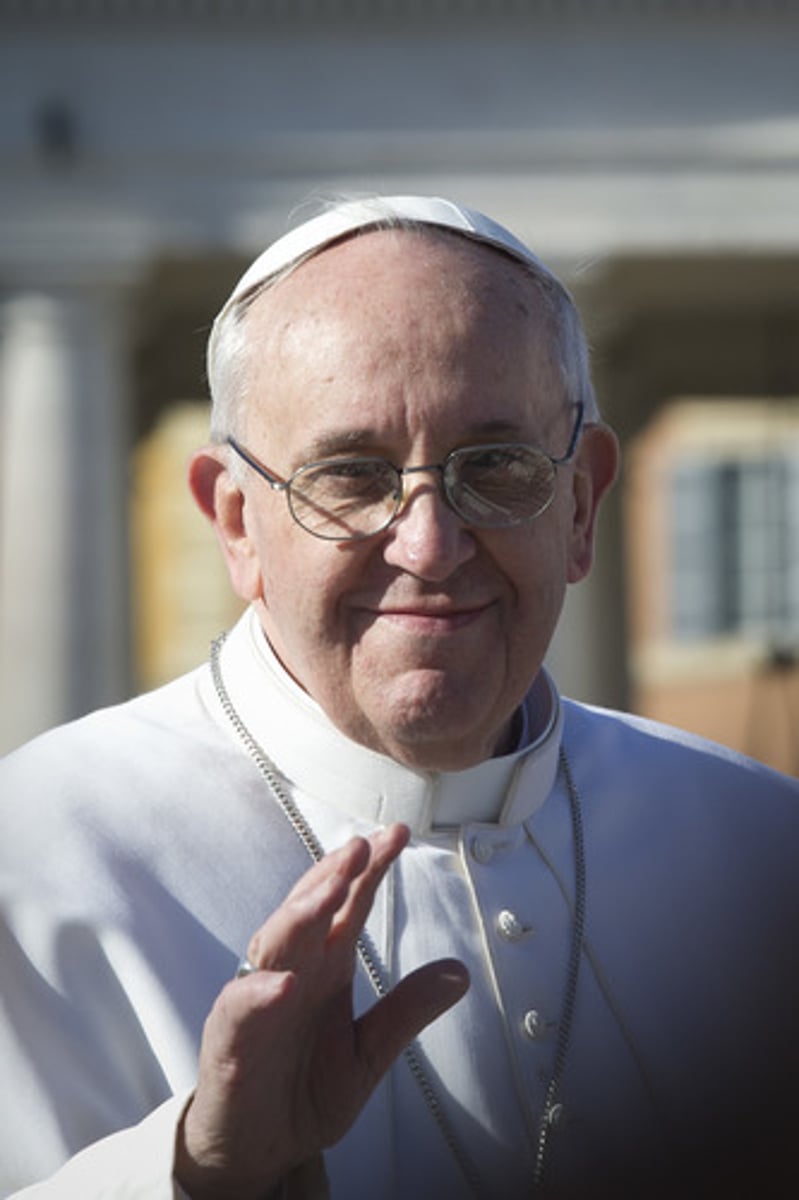
Cardinal
A member of a special college that elects the Pope (the college of cardinals). This person assists the Pope in administering the Church.
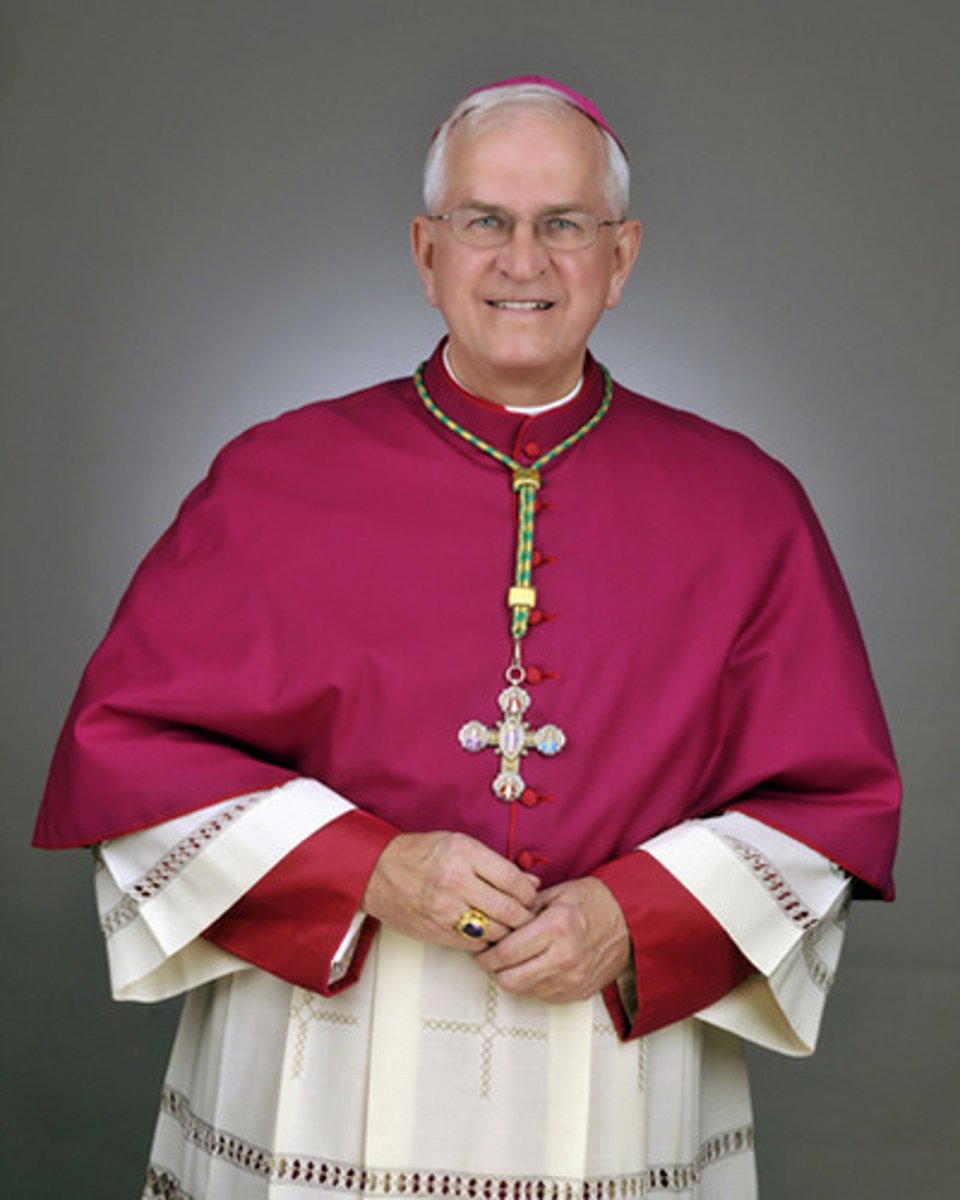
Bishop
Comes from the Greek word for "overseer." By divine institution, he succeeds the Apostles through the Holy Spirit, who is given to him. He is constituted a pastor in the Church, the teacher of doctrine, the priest of sacred worship, and the minister of governance.
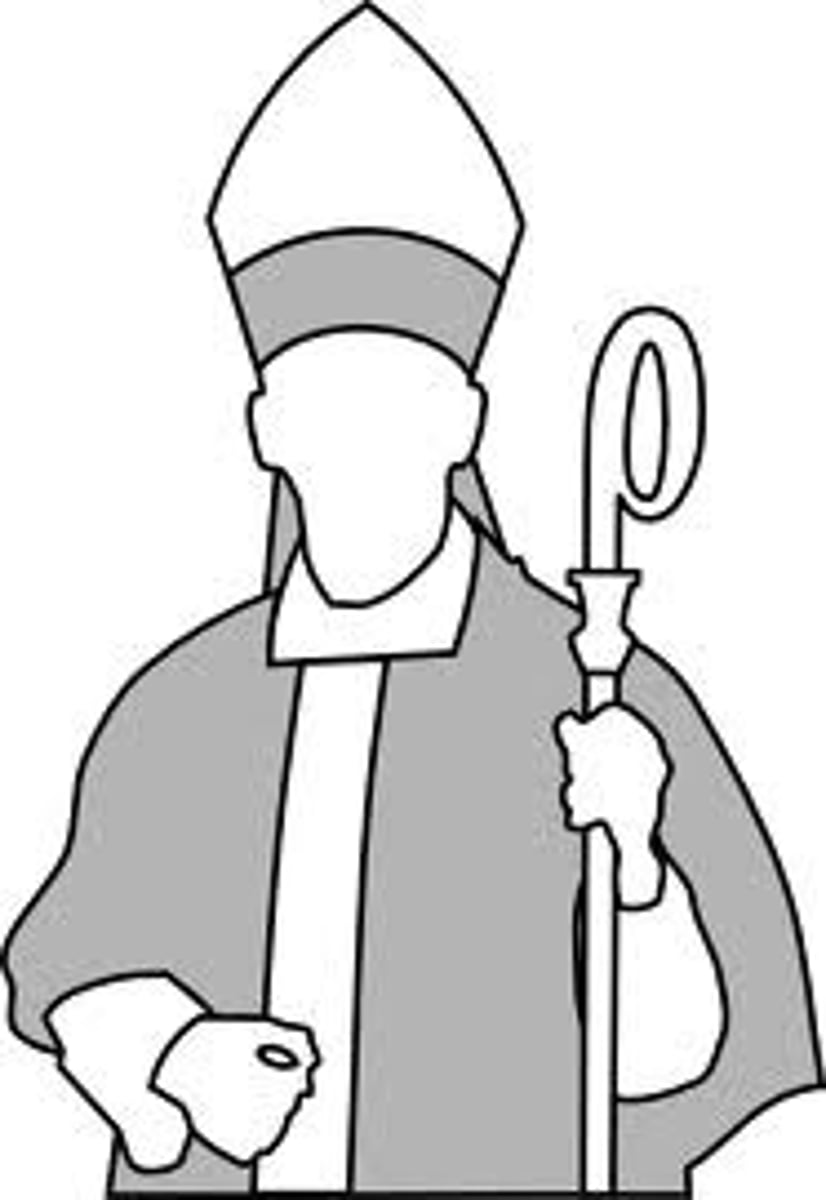
Priest
A term derived from the Greek word presbyteros. In the Church, a priest is a baptized and confirmed male who ordained to be a co-worker with his bishop, to preside at public liturgies, to celebrate the Sacraments and assist his bishop in priestly service to the People of God.
Deacon
From the Greek word for "servant"; one who has been ordained to the third degree of Holy Orders, ordained not to priesthood but for ministry and service.
Laity
All the faithful, except those in Holy Orders and those in the state of religious life specially approved by the Church. They carry out, for their own part, the mission of the whole Christian people in the Church and in the world.
Diocese
A portion of the People of God that is entrusted to a bishop to be nurtured by him, with the cooperation of his priests, in such a way that, remaining close to its pastor and gathered by him through the Gospel and the Eucharist in the Holy Spirit, it constitutes a particular Church. In this Church, the one, holy, catholic, and apostolic Church of Christ truly exists and functions.
Cathedra
The chair of the bishop located in a cathedral from which he governs his diocese. Papal infallibility occurs when the Pope speaks "ex cathedra," or " 'from the chair' of St. Peter."
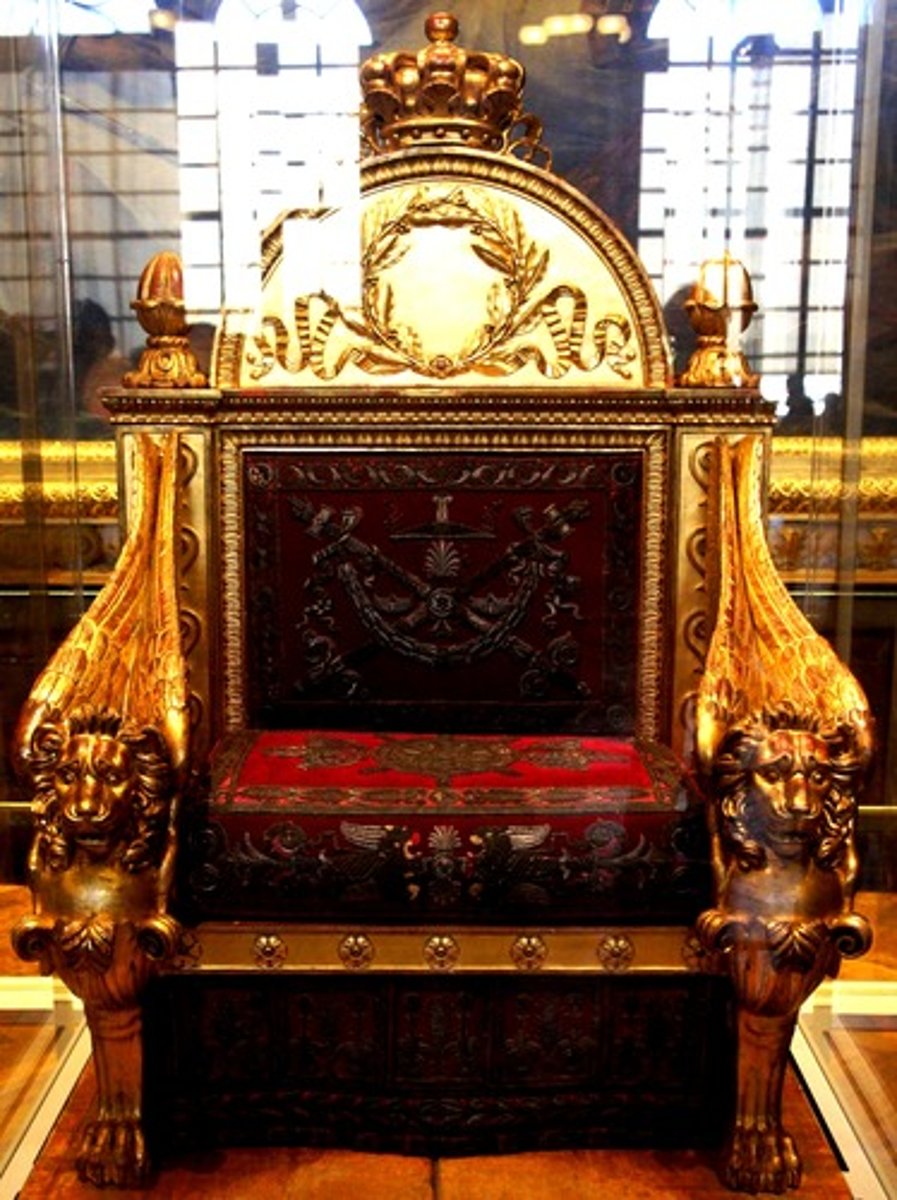
Pontiff
Means "bridge builder." This title for the Pope states that he is responsible for maintaining the bridge between Jesus and His Church.
Vicar of Christ
Papal title first used by Pope Innocent III in place of "Vicar of St. Peter." "Vicar of Christ" emphasized his understanding of the Pope as the representative of Christ himself.
Conclave
From the Greek word for "with key"; the gathering of the world's cardinals for the election of a new Pope, which takes place in the Sistine Chapel in the Vatican behind closed doors.
Papal Infallibility
The guarantee that the Pope and the Magisterium would be infallible, or "free from error," in their public teachings on matters of faith and morals. It is made possible by the work of the Holy Spirit in the Church. Hence, the papacy preserves the truth of God that liberates Church members from error.
